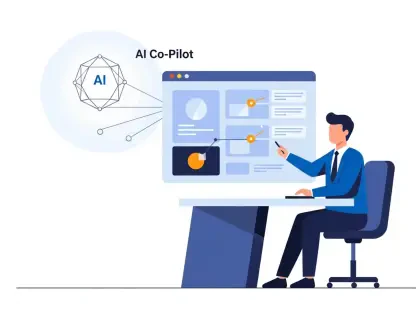In an era where data drives decision-making, enterprise AI has emerged as a cornerstone of business transformation, with a staggering projection that the global AI market will reach over $500 billion by 2027. Companies across industries are racing to harness artificial intelligence to unlock insights from vast datasets, streamline operations, and deliver tailored customer experiences. Amid this competitive landscape, two tech giants, Oracle and Microsoft, stand out as pivotal players reshaping how enterprises approach AI and data solutions. Their groundbreaking collaboration is setting new benchmarks, merging robust data management with cutting-edge cloud and AI capabilities to address the complex demands of modern businesses.
The Landscape of Enterprise AI and Data Solutions
Enterprise AI has become a critical component of strategic planning, enabling organizations to process and analyze data at unprecedented scales. This technology empowers businesses to predict market trends, optimize supply chains, and enhance customer engagement through personalized offerings. As digital transformation accelerates, the integration of AI into core operations is no longer optional but a fundamental requirement for maintaining a competitive edge in a rapidly evolving marketplace.
Key players like Oracle and Microsoft dominate this space, leveraging their expertise to deliver comprehensive solutions that span data management and AI innovation. Their influence is amplified by the rise of multicloud environments, where businesses operate across multiple cloud platforms to maximize flexibility and resilience. This approach allows enterprises to avoid vendor lock-in while accessing best-in-class tools tailored to specific needs, fostering an ecosystem of interoperability and scalability.
The technological backbone of this shift lies in advancements in cloud computing and sophisticated data management systems. Partnerships between industry leaders play a vital role in shaping trends, as seen in collaborative efforts that combine strengths to tackle complex challenges. Such alliances are driving the adoption of integrated platforms, ensuring that businesses can seamlessly navigate the intricacies of AI deployment while maintaining robust data governance and security standards.
Key Innovations by Oracle and Microsoft in Enterprise AI
Pioneering Multicloud Partnerships and AI Integration
The collaboration between Oracle and Microsoft represents a landmark in multicloud innovation, exemplified by initiatives like Oracle Database@Azure. This offering merges Oracle’s deep-rooted expertise in database technology with Microsoft Azure’s expansive cloud infrastructure and AI tools, including integrations with OpenAI and Copilot Studio. The result is a powerful platform that enables enterprises to manage critical data workloads with enhanced scalability and intelligence.
A notable development within this partnership is the Oracle AI Database, designed to bridge data management and AI functionalities seamlessly. This solution facilitates the direct application of advanced AI models to corporate data, ensuring that insights are derived with minimal latency. By prioritizing high-performance connectivity, the platform supports real-time decision-making, a crucial advantage for businesses operating in dynamic environments.
Emerging trends from this alliance highlight a focus on low-latency, high-performance solutions that cater to the growing demand for immediate data access and processing. The integration of AI tools directly into database environments marks a shift toward unified systems where data and intelligence operate in tandem. This convergence is redefining how enterprises approach application development and operational efficiency, setting a new standard for technological synergy.
Market Impact and Adoption Trends
Across industries, enterprises are embracing these innovations to modernize legacy systems and migrate workloads to the cloud. The joint solutions offered by Oracle and Microsoft are particularly effective for organizations seeking to update outdated infrastructure while embedding AI capabilities into their operations. This dual focus on modernization and intelligence is driving widespread adoption among businesses eager to stay ahead of market demands.
The global reach of these solutions is evident in the availability of the Oracle AI Database across more than 30 Microsoft regions worldwide. Such extensive accessibility ensures that companies, regardless of geographic location, can leverage these tools to enhance their data strategies. This expansive deployment underscores the scalability of the partnership’s offerings, catering to a diverse range of enterprise needs and operational scales.
Looking ahead, the demand for integrated AI-data platforms is poised to grow significantly, fueled by market drivers such as the need for agility and competitive differentiation. Forecasts suggest that from 2025 to 2027, adoption rates will surge as more organizations recognize the value of combining data management with AI insights. This trajectory points to robust growth potential, positioning Oracle and Microsoft as leaders in shaping the future of enterprise technology.
Challenges in Implementing AI-Driven Data Solutions
Despite the promise of AI-driven data solutions, enterprises face significant hurdles in implementation, particularly around integration complexities. Merging existing systems with new platforms often requires substantial reconfiguration, which can disrupt operations if not managed carefully. These challenges are compounded when dealing with diverse IT environments that lack standardization across tools and processes.
Cost barriers also pose a considerable obstacle, as the investment required for AI and cloud adoption can be prohibitive for some organizations. Beyond initial expenses, ongoing maintenance and training costs add to the financial burden. Additionally, ensuring system reliability during modernization efforts remains a concern, as any downtime or data loss can have severe repercussions for business continuity.
To address these issues, tailored migration frameworks and enhanced customer support are essential strategies. Providing clear roadmaps for workload transitions can minimize disruptions, while dedicated assistance helps organizations navigate technical challenges. By focusing on customized solutions and proactive problem-solving, Oracle and Microsoft can facilitate smoother adoption, ensuring that enterprises reap the benefits of AI without undue strain on resources.
Navigating the Regulatory and Security Landscape
The regulatory environment surrounding enterprise AI is increasingly stringent, with data privacy laws and compliance standards shaping how multicloud solutions are deployed. Regulations such as the General Data Protection Regulation in Europe and various regional mandates in the United States demand rigorous oversight of data handling practices. Non-compliance can result in hefty fines and reputational damage, making adherence a top priority for businesses.
Oracle and Microsoft prioritize data governance and security within their platforms, striking a balance between innovation and responsibility. Their offerings are designed to safeguard sensitive information through robust encryption and access controls, ensuring that enterprises can leverage AI without compromising data integrity. This focus on secure architectures builds trust among users, particularly in industries with heightened regulatory scrutiny.
Compliance directly influences enterprise adoption, as businesses must align their AI initiatives with legal requirements. The ability of Oracle and Microsoft to address security concerns—through features like automated threat detection and regular audits—plays a critical role in encouraging uptake. By embedding regulatory considerations into their solutions, these companies help organizations navigate complex landscapes while maintaining a focus on technological advancement.
Future Directions for Enterprise AI with Oracle and Microsoft
The trajectory of enterprise AI points toward deeper integration of multicloud and AI technologies, with Oracle and Microsoft at the forefront of this evolution. Future advancements may include more sophisticated tools for real-time data insights, enabling businesses to respond instantly to market shifts. Such capabilities will likely redefine operational agility, offering unprecedented opportunities for innovation.
Emerging disruptors, including shifting consumer expectations and market volatility, are influencing AI-data strategies. Enterprises must adapt to demands for hyper-personalized experiences, requiring platforms that can process and act on data with precision. Oracle and Microsoft are well-positioned to address these challenges by enhancing their offerings with features that prioritize customization and responsiveness in unpredictable environments.
Global economic factors and evolving regulatory frameworks will also shape the landscape, pushing for solutions that balance cost-effectiveness with compliance. Areas like personalized customer experiences and predictive analytics stand out as key innovation fronts, promising to transform how businesses engage with their audiences. As these trends unfold, the partnership between Oracle and Microsoft will likely continue to drive progress, setting benchmarks for the industry at large.
Conclusion: The Impact and Potential of Oracle-Microsoft Collaboration
Reflecting on the strides made, the alliance between Oracle and Microsoft has proven transformative in redefining enterprise AI through integrated, secure, and scalable platforms. Their combined efforts have addressed pressing business needs, from modernizing legacy systems to enabling real-time insights, establishing a model for collaborative innovation. The impact of their solutions has reverberated across industries, empowering organizations to navigate digital complexities with confidence.
Moving forward, enterprises that invest in these AI-driven data solutions stand to gain a competitive edge, provided they prioritize strategic planning and robust support structures. A key consideration is to focus on phased implementations to mitigate risks associated with integration. Exploring partnerships with experienced consultants could further streamline adoption, ensuring alignment with long-term goals.
Additionally, staying attuned to regulatory shifts and emerging technologies remains critical for sustained success. Businesses are encouraged to invest in continuous learning and adaptation, leveraging the evolving capabilities of Oracle and Microsoft platforms. By fostering a culture of innovation and vigilance, organizations can unlock the full potential of enterprise AI, paving the way for enduring growth and resilience.









